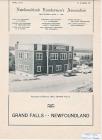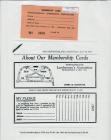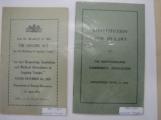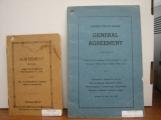1
Chapter 4The forming of The Newfoundland Lumbermen's Association (NLA) and the International Woodworkers of America (IWA) strike.
''Those who toil should also enjoy the wealth created by their labour'' Joseph J. Thompson.
Joseph J. Thompson (1889-1970) was born in Point Leamington and started working eleven hour days, at the age of ten, in the G. L. Phillips sawmill at Point Leamington, for $1.50 a week. At age eleven he worked in the lumber camps. He continued to work as a logger in central Newfoundland until the 1930's. Early exposure to the harsh working conditions of the lumber camps inspired him to take the steps he did to form a union.
On August 5, 1935, J. J. Thompson called a loggers meeting in his hometown of Point Leamington, Newfoundland. He addressed the working conditions and pay concerns of the lumber camps, then suggested forming a union. Loggers in attendance agreed to back Joe's effort and thus elected him as their leader. Early in 1936 the constitution and bi-laws of the NLA were completed. In April of the same year, Joe borrowed $250.00 from his supporters to obtain a Charter of Registration in St. John's, Newfoundland. The annual membership fee was $1.00. The loggers were only making $2.10 a day, nevertheless the organizational campaign was very successful, with often 100% registration at each work sight. Joe negotiated his first contract with the Anglo-Newfoundland Development and organized 32 regional councils of the NLA from Trinity Bay to White Bay. The Following year he negotiated a similar agreement with the International Power and Paper Co. at Corner Brook. A two-day strike against the Anglo-Newfoundland Development (AND) Company in 1936 resulted in policy change giving the loggers higher wages. In May 1936, seven hundred men left their camps and marched through Corner Brook in protest against the International Power and Paper Co. who refused to negotiate an agreement with the loggers over camp conditions and wages. Two days later an agreement was reached and original request regarding wages had been met.
The first convention of the association was held in August 1937 at Point Leamington, Newfoundland. ''The first union office was the old post office located across from the SA church. Later a new building was erected on the same site, as told by Nelson Thompson on Aug. 7, 2000 (who later purchased the building for a home). The policies and procedures were established, which guided the operation of the union for twenty years. By 1950, Thompson's N.L.A. was the largest single labor union in Newfoundland with over 12,000 members. The life of the loggers improved greatly.
After Confederation, in 1949, Joe Thompson sought International affiliation for the N.L.A. . In 1956, the N.L.A.'s independence as a union ended when the Trades and Labor Congress (TLC) and the Congress of Canadian Labor (CCL) merged to form the Canadian Labor Congress. The N.L.A. had been an independent member of the Newfoundland Federation of Labor without affiliation to either the TLC or the CCL but this arrangement ended the merger. The N.L.A. had to now choose between two rival unions, the International Brotherhood of Carpenters and Joiners (IAC) or the International Woodworker of America (I.W.A.), who arrived in the province in the late 1950's. Joe attempted to deliver the N.L.A. membership to the United Brotherhood of Carpenters and Joiners but the members voted overwhelmingly to affiliate with the I.W.A., organized by H. Landon Ladd. This proved to be disastrous for the loggers.
Meanwhile, by any standards, conditions at the logging camps were unbelievably bad, men worked ten hour days, six days a week for $1.05 an hour. Forty years later, in an interview with Bob Benson of The Telegram, H. Landon Ladd (a former I.W.A. organizer) stated '' The conditions in the Newfoundland logging camps was a disgrace''. A royal commission report into the loggers strike published in 1961 stated ''Dark and squalid hovels which would not be used for hen-houses, except for the most primitive farmer, dirt is everywhere, rats are common''. So, with the backing of 97% of its members, the I.W.A. went on strike on December 31,1958.
During the strike, logging roads and camps were picketed by union supporters and trucks carrying pulp to the mills were stopped on public highways. On January 20, 1959, the RCMP arrested fifteen picketers for stopping trucks on the Point Leamington Highway. On February 7, 1959, ninety-four I.W.A. strikers were rounded up by police officers, from two logging camps and forced to walk to Grand Falls in sub zero weather. Tempers soared. The Premier of the province of Newfoundland (Joseph R. Salmwood) then decided that things had gone far enough so he addressed the province through a televised speech. He stated that he would form a new union, the Newfoundland Brotherhood of Woodworker, to oppose the I.W.A. The speech caused events to happen much more quickly. On March 9, 1959, about 250 strikers blocked the woods road heading into Badger (a stronghold of I.W.A. supporters). Then the next day, on March 10, 1959, there were about seventy police officers in the town. The officers walked down the street three persons wide, ordering the strikers to stand aside. The strikers broke up and the officers noticed a man carrying a lengthy piece of birch (wood). The order was given to ''Get that man'', and the police rushed the crowd. Strikers wives and children were among the people but the police began wielding their batons. Loggers were beaten to the ground and handcuffed. Minutes later ,Constable William Moss was found lying on the ground with a blow to the head. He was rushed to the Lady Northcliff Hospital where he died from his injuries. His assailant has never been found.
By the end of March,1959, the I.W.A. was telling its members to join the Newfoundland Brotherhood of Woodworker. Once the I.W.A. pulled out, the companies gave the union nearly everything it wanted. When the N.L.A. 's independence as a union ended in 1956, Joe went to work with the United Brotherhood of Carpenters and Joiners. He succeeded in getting them to honour a clause in the N.L.A. constitution which guaranteed him a salary for life but the I.W.A. refused to make such a deal. Joe remained with UBC until his retirement.
Joseph Thompson died in 1970 in Point Leamington, Newfoundland. The present bridge spanning the Mill River has been renamed the J.J. Thompson Bridge in his honour.
2
Joseph J. Thompson (1889-1970)1940's
Point Leamington, Newfoundland, Canada
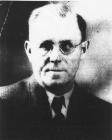 Credits:
Credits:Georgina Randell
3
Certificate of Registry, Newfoundland Lumbermen's Association27 November 1947
St. John's, Newfoundland, Canada
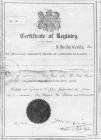 Credits:
Credits:Walter Scott
8
Joseph John Thompson (1889-1970)early 1950's
Point Leamington, Newfoundland, Canada
 Credits:
Credits:Heritage Center
9
H. Landon Ladd, Pres., District 2, International Woodworkers of America.1939
St. John's, Newfoundland, Canada
 Credits:
Credits:Heritage Center
10
Harvey Alexander Landon Ladd (1917-1998
St. John's, Newfoundland, Canada
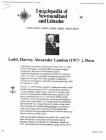 Credits:
Credits:Harry Cuff
Encyclopedia of Newfoundland and Labrador
11
Article from Telegram: A bitter clash (IWA strike, 1939)24 January 1999
Grand Falls, Newfoundland, Canada
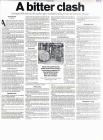 Credits:
Credits:Bob Benson
The Evening Telegram
12
A plane used to parachute union organizers into bush during strike1939
Point Leamington, Newfoundland, Canada
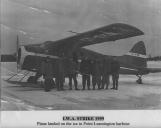 Credits:
Credits:Heritage Center
13
Article from ''The Newfoundland Lumberman'' newspaper, Sept. 20,1939.20 September 1939
Grand Falls, Newfoundland, Canada
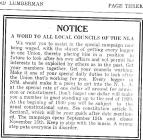 Credits:
Credits:The Newfoundland Lumbermen's Editor
14
Convention 1939: Newfoundland Lumbermen's Association1939
Bishops Falls, Newfoundland, Canada
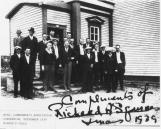 Credits:
Credits:Walter Scott
